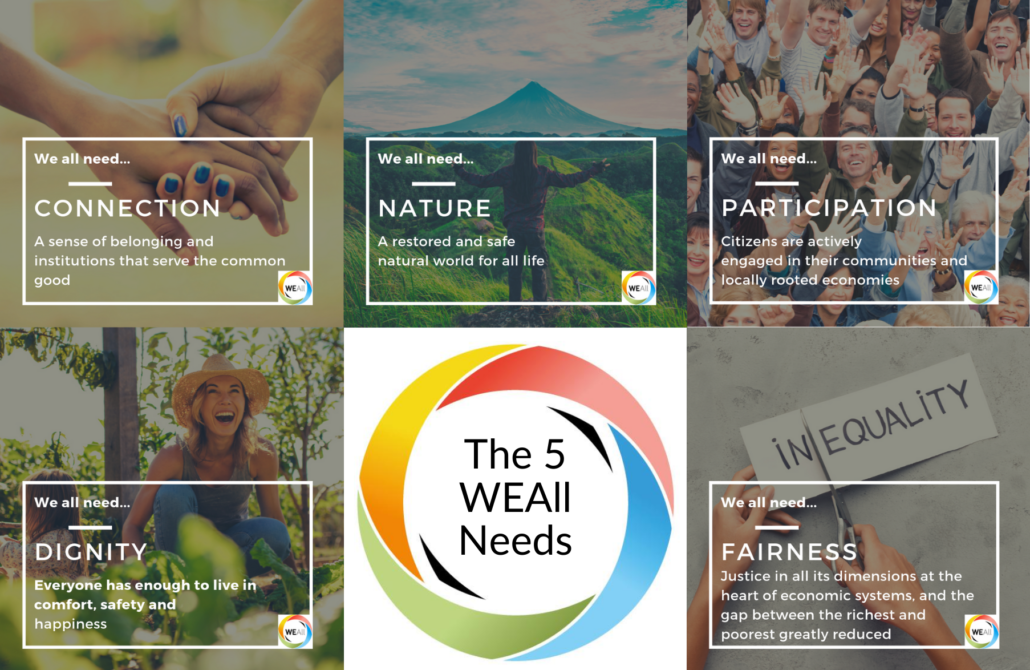By: Isabel Nuesse
Founded on ideals of white superiority, rooted in colonial behavior, rich due to the exploitation and oppression of indigenous and black communities; this is the story of the US that has been avoided for the last 250 years.
With the performative slogan, ‘United We Trust’, we endeavor to pursue unity without acknowledging the hurt of so many.
We are in need of deep repair and healing. And only through that repair, can we consider rebuilding to a Wellbeing Economy in the US.
In their episode, ‘Confrontation’, the hosts of the podcast, Invisibilia, explain that the first step is to air our grievances with each other, confronting the issues. We must allow people to speak their truths, without repercussions.
“There is a need for people to be in your face and hear the situation. We’ve got to be able to address it. But I think at the same time, there has to be a meaningful, and purposeful conversation behind it. If I’m just going to make you mad without doing the bonding and the education and growth, all I’ve done is make you mad.”
Invisibilia “Confrontation”, NPR
They emphasize that once the feelings are expressed, the repair can begin through meaningful conversation to support that bonding, education and growth. This starts with acknowledging what people are asking for.
To build a Wellbeing Economy there must be belief that most humans want similar outcomes, that common ground can be found.
A Wellbeing Economy is one that delivers social justice on a healthy planet by addressing five universal needs.

Katherine Trebeck speaks of this in a recent interview: “people around the world consider the same core issues important. Think fresh air, clean rivers, financial security, and strong relationships”
This idea is echoed in a quote from Theodore R. Johnson,
“Even amid all the division broadcast across traditional and social media, most of us want similar things from our society. We want to be treated equally. We want to be included and respected in our communities. We want our institutions and systems to be fair and just. And if the government derives its power from our consent, then we have the ability to make our country more unified if we are willing to focus on what we have in common so we can work through the areas where we differ.”
Theodore R. Johnson
If we can agree that we share common needs, we can begin to answer the how. How does a country, state, or town begin to deliver on those needs?
In a Robert Wood Johnson Foundation webinar, “Reimagined in America” Katherine Trebeck and Lisa Parson, a member of the Wellbeing Project in Santa Monica, California discuss a practical example of where in the US we are learning how to build a Wellbeing Economy. A part of Santa Monica’s Wellbeing Project is an open-source wellbeing survey, which provides a better understanding of who residents are, how they are doing, and their concerns. This provides inputs into a Wellbeing Index for the city.
Katherine explains why this is important,
“The conversations and the deliberative nature of that is important. To tell residents that their voices matter in this. Particularly for the most marginalized communities. These efforts take a long time, but if you just start, then things can happen.”
WEAll recently published a paper which sets out a path to rebuild to a Wellbeing Economy in the US. The paper stresses that the path to rebuild our economy is founded on the principles of economic freedom, security, resilience, justice and leadership – and that it can be done. The questions we must answer are; are willing to go there, to dig deep, to be vulnerable, to forgive, to repair, to heal and to ultimately change?
The confrontations needed have just begun and we’re a long way away. But I have hope.
Building a Wellbeing Economy is a process which requires many steps. And as Lisa Parson, who is creating Santa Monica’s Wellbeing survey and Index, says: “You just have to start.”
the discussion?
Let us know what
you would like
to write about!
